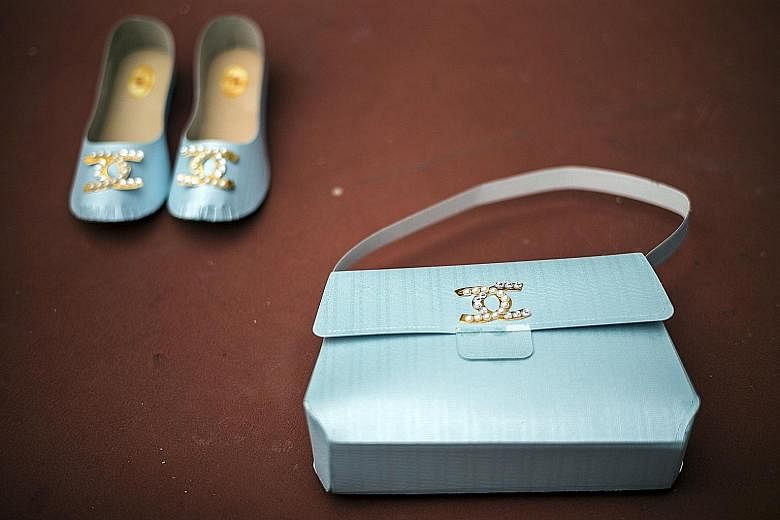HONG KONG • On Java Road in Hong Kong, a new pair of brown leather Gucci loafers, lovingly wrapped in cellophane, hangs from a storefront - the deal of a lifetime at less than US$3 (S$4).
Just not this lifetime.
The shoes are paper replicas, meant to be burnt as offerings to relatives who have died - a modern twist on an old Chinese custom. At speciality shops across this city, the bereaved can choose from an impressive array of goods to send to their departed loved ones, including Italian sports cars, smartphones, six-packs of beer, dress shirts and sports jackets.
One store, next to Hong Kong's Ten Thousand Buddhas Monastery, sells paper replicas of McDonald's value meals, complete with fries, soda and a package of something called Chicken MuNeggtc.
But the Gucci handbags and shoes that grandmother may have cooed over when she was among the living now appear to be out of her ethereal reach.
Last week, Gucci's parent company, Paris-based Kering, sent a letter to six local stores that sell the paper offerings, telling them to stop selling replicas of Gucci products because they were using its famous trademark that graces shoes, wallets, hats, jewellery and women's purses.
Ms Charlotte Judet, a Hong Kong-based spokesman for Kering, said over the telephone: "What we are trying to do is let them know that Gucci is a trademark and we are trying to protect it. We fully respect the funeral context."
Gucci's letter drew some ridicule in the local press.
"The symbolism of a global, multibillion-dollar luxury company 'warning' perhaps some of the poorest retailers in the city over items that could not ever be taken for the real thing just seems a little bullying," Jing Zhang, fashion editor for The South China Morning Post, wrote on Tuesday.
Gucci said in a statement yesterday: "We regret any misunderstandings that may have been caused and sincerely apologise to anyone we may have offended through our action. We trust that the funeral store owners did not have the intention to infringe Gucci's trademark. Accordingly, we did not suggest any legal action or compensation."
It did not say whether it would continue to ask shops to take the replicas off the shelves. But a source close to the matter said most of the six stores had agreed to stop selling the products.
Elaborate paper offerings for the dead are for sale the world over, available for purchase by the living across Asia, from Cambodia to China.
In China, the bereaved, with a few clicks of a mouse or taps on a smartphone, can buy replicas of everything from bonsai plants to television sets for home delivery.
As incomes have soared and consumerism has taken hold across the continent, the cardboard replicas, once limited to fake currency, have become more elaborate: One shop offers a paper wall- unit air-conditioner, presumably for relatives in the lower reaches of the hereafter.
The practice has migrated across the ocean. In 2011 in New York, a Chinatown shopkeeper was arrested for selling cardboard replicas of designer handbags and charged with copyright infringement.
But Gucci chose to make a stand in Hong Kong. It is a city that combines a no-holds-barred consumer culture, a strong bond to China's old traditions and a robust legal system, inherited from the British, that respects and enforces intellectual property rights. "People in Hong Kong are law-abiding," Ms Alice Lee, an associate professor of law at the University of Hong Kong, said. "We have had the benefit of British rule for such a long time."
But she said Gucci would have a difficult time proving that makers of paper offerings infringed on its trademark.
To successfully sue for trademark infringement, she said, a company has to demonstrate that people confuse the replicas with real Gucci products, which is unlikely.
Although some store owners heeded Gucci's warning, others seemed unfazed. "These items are not used by living people, it's just to commemorate ancestors and for them to use," Mr To Chin Sung, the manager of one shop, said.
He had not received the letter, although he does sell paper handbags resembling Gucci products.
"If they send us a letter, we'll respond jokingly by saying perhaps we can help send it to the underworld and see how it's received there."
NEW YORK TIMES, AGENCE FRANCE-PRESSE

